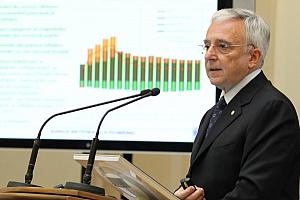EC: Romania should still fix excessive deficit by 2022

The European Commission on May 20 recommended Romania to take action, in 2020 and 2021, and pursue fiscal policies in line with the EU Council's recommendations of April 3. Romania should fix its excessive deficit by 2022, according to the EC's annual recommendations to the 27 Member States, called the European Semester.
The recommendations come in response to the 2020 National Reform Programme and the 2020 Convergence Programme submitted by Romania on May 8 and May 14, respectively - not yet published by the Government.
In its 2020 Convergence Programme, the Government expects the budget deficit to widen from 4.3% of GDP in 2019 to 6.7% of GDP in 2020. The public debt-to-GDP ratio is expected to increase from 35.2% in 2019 to 40.9% in 2020.
Meanwhile, the European Commission expects Romania's budget deficit to reach 9.2% of GDP in 2020 and 11.4% of GDP in 2021 while the general government debt-to-GDP ratio could go up to 46.2% in 2020, according to the Commission's Spring Forecast.
The Commission's new recommendations indicate that Romania should fix its excessive deficit by 2022, irrespective of the activation, on March 20, of the general escape clause of the Stability and Growth Pact. This clause allows for a temporary deviation from the adjustment path towards the medium-term budgetary objective, "provided that this does not endanger fiscal sustainability in the medium term."
The long-term sustainability of Romania's public finances was already at risk before the COVID-19 outbreak due to high budget deficits and the significant rise in public pensions, the Commission stressed. Thus, in Romania's case, the current budgetary deviation reflects more than the effects of expenditures to mitigate the pandemic.
The Commission has recommended Romania to avoid permanent measures that would endanger fiscal sustainability (pension hikes), develop flexible working arrangements (kurzarbeit system), keep providing liquidity to the real sector, front-load mature public investments (that can be completed quickly), and promote private investment to foster the economic recovery.
The recommendations also include measures that involve significant public expenditures that come somehow against the fiscal consolidation trajectory recommended on April 3 (even if adjusted for pandemic effects): strengthen skills and digital learning and ensure equal access to education; increase the resilience of the health system; provide adequate income replacement and extend social protection measures and access to essential services for all.
In early April, the EU Council suggested that Romania should reach a government deficit target of 3.6% of GDP in 2020, 3.4% of GDP in 2021, and 2.8% of GDP in 2022.
(Photo: Pixabay)
editor@romania-insider.com













